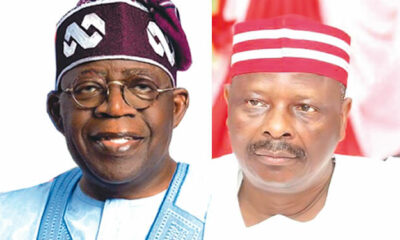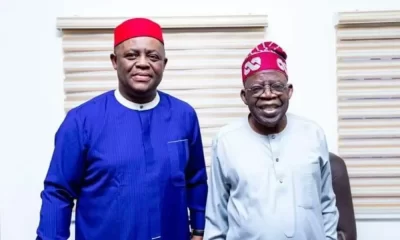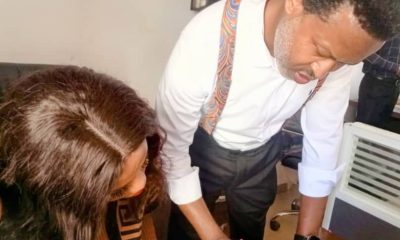News
Tinubu fires service chiefs and dissolves MDA boards

Yesterday, there was a sack gale in the nation’s security architecture, as well as ministries and parastatals. President Bola Tinubu retired all service chiefs, advisers, and the Comptroller-General of Customs, as well as dissolved boards of Ministries, Departments, and Agencies (MDAs) and parastatals.
In a move that shook the country’s security firmament, the president also replaced some top military commanders.
President Tinubu, who recently ordered security chiefs to collaborate and crush oil thieves and criminals, made the changes just before departing for his first foreign trip as elected head of state.
Tinubu “approved the immediate retirement of all service chiefs and the Inspector-General of Police, Advisers, and Comptroller-General of Customs from service as well as their replacements with immediate effect,” according to a statement issued on behalf of the Secretary to the Government of the Federation, SGF, by Mr. Willie Bassey, Director of Information.
General Lucky Irabor, Chief of Defence Staff, Lt. Gen. Farouk Yahaya, Chief of Army Staff, Vice Admiral Awwal Gambo, Chief of Air Staff, Air Marshal Isiaka Amao, and Inspector-General of Police, Usman Alkali Baba all retired yesterday.
New service commanders
The newly appointed service chiefs are: lMallam Nuhu Ribadu, National Security Adviser\slMaj. Gen. C.G Musa, Chief of Defence Staff\slMaj. Gen. T. A Lagbaja, Chief of Army Staff\slRear Admiral E. A Ogalla, Chief of Naval Staff\slAVM H.B Abubakar, Chief of Air Staff\slDIG Kayode Egbetokun, Acting Inspector-General of Police\slMaj. Gen. EPA Undiandeye, Chief of Defence Intelligence\slAdeniyi Bashir Adewale, Ag. Comptroller-General of Customs.
Among the other notable appointments are:
Colonel Adebisi Onasanya, Brigade of Guards Commander lLt. Col. Moshood Abiodun Yusuf, 7 Guards Battalion, Asokoro, Abuja lLt. Col. Auwalu Baba Inuwa, 177 Guards Battalion, Keffi, Nasarawa State lLt. Col. Mohammed J. Abdulkarim, 102 Guards Battalion, Suleja, Niger lLt.
Similarly, the President approved the following military officer appointments in the Presidential Villa:
Maj. Isa Farouk Audu, (N/14695) Commanding Officer State House Artillery lCapt. Kazeem Olalekan Sunmonu (N/16183), Second-in-Command, State House Artillery\slMaj. Kamaru Koyejo Hamzat (N/14656), Commanding Officer, State House Military Intelligence\slMaj. TS Adeola (N/12860), Commanding Officer, State House Armament\slLt. A. Aminu (N/18578) Second-in-Command, State House Armament.
President Tinubu also approved the appointment of two additional special advisers and two senior advisers.
Assistants Are:
Hadiza Bala Usman, Policy Coordination Special Advisor
Special Adviser, Culture and Entertainment Economy, Hannatu Musa Musawa
Senior Special Assistant, National Assembly Matters, Senator Abdullahi Abubakar Gumel (Senate)
“The appointed service chiefs, the Inspector-General of Police and the Comptroller-General of Customs are to act in their positions, pending their confirmation in accordance with the Constitution of the Federal Republic of Nigeria,” said Mr. Olarewaju Kunle Ibrahim, Senior Special Assistant, National Assembly Matters (House of Representatives).
Why did Tinubu take such drastic measures?
According to security sources, President Tinubu is disturbed by the country’s raging wave of insecurity and wishes to halt the trend in order to pave the way for programmes that will pay dividends.
In his inaugural address, the president stated that security would be his top priority because development cannot occur without it.
“Security will be our administration’s top priority because neither prosperity nor justice can thrive in the face of insecurity and violence.” To combat this threat effectively, we must reform both our security doctrine and its architecture.
“We will invest more in our security personnel, which means more than just increasing the number. “We will improve training, equipment, pay, and firepower,” he said.
He had ordered service chiefs and heads of security and intelligence agencies to crush criminals and anyone involved in oil theft on June 1, two days after assuming power, at a meeting with Security and intelligence heads led by the Chief of Defence Staff, General Lucky Irabor, at the Presidential Villa, Abuja, saying that his administration will not tolerate criminality.
READ ALSO: Photos: Erelu Bisi Adeleye-Fayemi: An Amazing Amazon, Brain and Beauty Turned 60
At the meeting were Lt. Gen. Farouk Yahaya, then Chief of Army Staff; Vice Admiral Awwal Gambo, Chief of Naval Staff; Air Marshal Isiaka Amao, Chief of Air Staff; and Usman Alkali Baba, Inspector-General of Police; Yusuf Bichi, Director-General of the Department of State Service; and Ahmed Rufai Abubakar, Director-General of the National Intelligence Agency, NIA.
Despite the order, the country’s killing spree continued, with 325 people killed and 150 kidnapped between May 29 and June 8, according to Vanguard’s checks and reported cases.
Prior to Tinubu’s appointment, insecurity claimed 98,083 lives in 12 years.
27,311 people during President Muhammadu Buhari’s first term, and 35,800 between 2019 and May 16, 2023.
The deaths were caused by terrorism, banditry, herders/farmers clashes, communal crises, cult clashes, and extra-judicial killings, among other things, according to data obtained from the Nigeria Security Tracker, NST, a project of the Council on Foreign Relations’ Africa programme.
To reverse this trend, Tinubu stated that he will embark on a number of security architecture reforms and has directed security agencies to develop a blueprint and redouble their efforts because “as far as he is concerned, this country should not be on its knees struggling while other countries work and achieve greater heights.”
As things stand, the former service chiefs’ efforts may not have met President Tinubu’s expectations.
Tinubu resigns from the boards of FG parastatals, agencies, institutions, and corporations.
President Tinubu has dissolved the boards of directors of all Federal Government parastatals, agencies, institutions, and government-owned businesses.
Senator George Akume, Secretary to the Government of the Federation SGF, stated in a late Monday statement that the action was taken in the exercise of the president’s “Constitutional Powers and in the Public Interest.”
He stated that the dissolution does not affect the Boards, Commissions, and Councils listed in the Third Schedule, Part 1, Section 153 I of the 1999 Federal Republic of Nigeria Constitution as amended.
“In light of this development, and until new boards are formed, the Chief Executive Officers of Parastatals, Agencies, Institutions, and Government-Owned Companies are directed to refer matters requiring the attention of their Boards to the President, via the Permanent Secretaries of their respective supervisory Ministries and Offices.”
“Permanent Secretaries are also directed to route such correspondence to Mr President through the Office of the Secretary to the Federation’s Government.” As a result, all Ministries, Departments, and Agencies must ensure compliance with the provisions of this directive, which went into effect on Friday, June 16, 2023.
“Permanent Secretaries are specifically directed to notify the Chief Executive Officers of the affected Agencies under their respective Ministries/Offices for immediate compliance,” Akume stated.


















